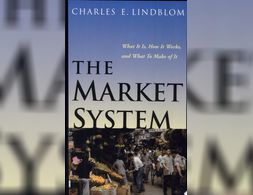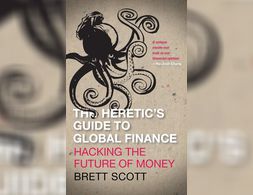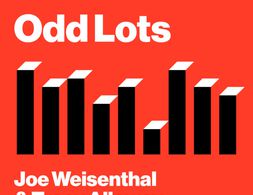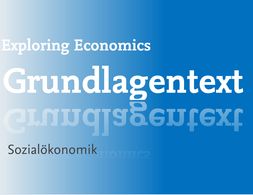518 Ergebnisse
Although money plays a key role in our lives, the workings of our monetary system are a mystery to most of us. ‘The Waterworks of Money’ by cartographer Carlijn Kingma is an attempt to demystify the world of big finance. It visualizes the flow of money through our society, its hidden power made manifest.
If you see money as water, our monetary system is the irrigation system that waters the economy. The better the flow, the more prosperous society will be. Just as water makes crops thrive, so money sets the economy in motion. Or at least that’s the idea. In reality, inequality is growing in many countries and people are dealing with a ‘cost of living crisis’. Meanwhile, the progress with making our economies sustainable is stalling, and financial instability remains an ongoing threat. These problems cannot be seen in isolation from the architecture of our money system. If we truly want to tackle them, we will have to address the design flaws of our current money system.
For more info check: https://www.waterworksofmoney.com or https://www.carlijnkingma.com
For the Dutch version of the animation check: https://www.ftm.nl/waterwerk
Current exhibitions: 'The Future of Money' at Kunstmuseum Den Haag, 14 April, 2023 - 8 September 2023. 'Plumbing The System' at the Dutch Pavilion of the Venice Biennale, 20 May 2023 - 26 November 2023
The second animation video of this series will be released in September 2023.
The Waterworks of Money is a collaboration of cartographer Carlijn Kingma, investigative financial journalist Thomas Bollen, and professor New Finance Martijn van der Linden. Kingma spent 2300 drawing hours, based on in-depth research and interviews with more than 100 experts –ranging from central bank governors and board members of pension funds and banks to politicians and monetary activists.
The structure of our monetary system is not a natural phenomenon. We can choose to change its architecture. Designing the money system– and the laws and institutions that govern it–is ultimately a democratic task, and not a commercial or technocratic one. In practice, however, there is a major obstacle impeding the democratic process: financial illiteracy. By making finance and money needlessly complex, economists, bankers and tax specialists have turned most of us into ‘financial illiterates’. Everyone who doesn’t speak their financial jargon is excluded from the democratic debate on how our monetary system should work.
The Waterworks of Money bypasses the financial jargon. It is an attempt to boost systemic financial literacy. Only if ordinary citizens develop their own vocabulary to participate in the debate about their financial future, can they tell their politicians which kind of ‘financial irrigation system’ they want.
Authors: Carlijn Kingma, Thomas Bollen, Martijn Jeroen van der Linden
Animation: Tiepes, Christian Schinkel, Cathleen van den Akker
Narrator: Loveday Smith
Translation: Erica Moore
Voice recording: Huub Krom
Music and sound: Rob Peters
Photography: Studio OPPA
Partners: Follow the Money, De Haagse Hogeschool, Stimuleringsfonds Creatieve Industrie, Brave New Works, Rabobank, Kunstmuseum Den Haag, Rijksmuseum Twenthe
This Blog Post describes the U.S. federal reserve money system from the perspective of the Modern Monetary Theory (MMT). Therefore it presents a theory of money creation, gives simple examples how this influences the economy and the historical process of why the monetary system of the US has developed this way.
In this clear and accessible book, an eminent political scientist offers a jargon-free introduction to the market system for all readers, with or without a background in economics
In this lecture, Sanjay Reddy reviews the work of János Kornai, especially his critique of the socialist system, which is rooted in his understanding of the eminently political character of socialism.
Obwohl viele technische Lösungen für gesellschaftliche Herausforderungen wie den Klimawandel auf der Hand liegen, sind wir als globale Gesellschaft häufig nicht in der Lage, diese umzusetzen. Warum führt die kollektive Erfahrung eines kollabierenden Systems nicht zur kollektiven Handlung? Ein Beitrag von Katrin Käufer und Claus Otto Scharmer.
The video presents different ways of how to measure the money supply and thereby explains the differences between M0, M1 and M2.
This panel was part of the conference "Next Generation Gentral Banking - Climate Change, Inequality, Financial Instability" 03. - 05.02.2021.
Since 2007, central banks of industrialized countries have counteracted financial instability, recession, and deflationary risks with unprecedented monetary policy operations. While generally regarded as successful, these measures also led to an exceptional increase in the size of central bank balance sheets. The book first introduces the subject by explaining monetary policy operations in normal times, including the key instruments (open market operations, standing facilities, reserve requirements, and the collateral framework).
From the two premises that (1) economies are complex systems and (2) the accumulation of knowledge about reality is desirable, I derive the conclusion that pluralism with regard to economic research programs is a more viable position to hold than monism. To substantiate this claim an epistemological framework of how scholars study their objects of inquiry and relate their models to reality is discussed. Furthermore, it is argued that given the current institutions of our scientific system, economics self-organizes towards a state of scientific unity. Since such a state is epistemologically inferior to a state of plurality, critical intervention is desirable.
This article outlines the fundamental challenges of democratically planned economies and categorises proposed models into six groups, each of which approaches planning and coordination at different levels of authority and between myriad economic units in a particular way, taking into account efficiency as well as democratic principles and environmental and social sustainability. Through a classification system based on decision-making authority and mediation mechanisms, the article provides a framework for understanding and comparing these models. By examining their different approaches, it offers insights into the complexities and potential paths of democratically planned economies in the 21st century.
One of the pluralist theories which has gained prominence following the 2008 financial crisis is Hyman Minsky and his Financial Instability Hypothesis (FIH). Minsky was unique in viewing balance sheets and financial flows as the primary components of capitalist economies, and his focus on the financial system meant he was well-equipped for foresee a crisis much like 2008. Although he died long before 2008 his framework anticipated many of the processes which led to the crash, particularly increased risk-taking and financial innovation which would outstrip the abilities of regulators and central banks to manage the system.
Popular anger against the financial system has never been higher, yet the practical workings of the system remain opaque to many people. The Heretic's Guide to Global Finance aims to bridge the gap between protest slogans and practical proposals for reform.
In order to describe the global structure of the monetary and financial system and its effects on the global economy, most economics textbooks rely on unappropriated theories that provide nothing but outdated descriptions. In this talk, key speakers in economics, economic history and banking try to make this complex system a little more understandable by relying on real-world insights.
The plumbing of the financial system is coming under strain like never before. On this week’s podcast, we speak with two legendary experts on how the money system works: Zoltan Pozsar of Credit Suisse and Perry Mehrling of the Frederick S. Pardee School of Global Studies. They explain the extreme level of stress we’re seeing, what the Fed has done to alleviate, what more needs to be done, and what the post-crisis future may look like.
The workshop deals with the contribution of Plural Economics to the urgently needed change of the economic system towards sustainability and global responsibility.
After completing the module, participants should be able to demarcate and explain different economic approaches to sustainability. They should be able to evaluate the respective concepts based on their contribution to the ecological transformation of the economic system.
The current global financial system may not withstand the next global financial crisis. In order to promote the resilience and stability of our global financial system against future shocks and crises, a fundamental reconceptualisation of financial regulation is necessary. This reconceptualisation must begin with a deep understanding of how today's financial markets, regulatory initiatives and laws operate and interact at the global level.
In "The Money Problem, "Morgan Ricks argues for a reform of the American monetary system. Taking up foundational questions of monetary policy, he asks: how would we construct a monetary system if we were starting from scratch? What are the characteristics of a monetary instrument?
This blog post reviews "Democratizing Finance", an edited volume that analyses and provides policy proposals to ensure that the financial system serves the public good. Mquzama undertakes the task of summarising the main takeaways from each essay in the book as well as an exposition of its shortfalls. While he acknowledges the necessity of the book's reimaging capitalism and the financial system in a way that is practical within the current economic and political structures, he also highlights its failure to look beyond the United States of America.
Complexity economics focuses on interactions and interdependencies between individuals and structures in economic systems. Those are systems of organised complexity. High importance is given to the analysis of networks.
Der Fokus der Komplexitätsökonomik liegt auf den Interaktionen und Wechselwirkungen zwischen Individuen und Strukturen wirtschaftlicher Systeme. Diese werden als Systeme organisierter Komplexität aufgefasst. Ein besonderes Augenmerk liegt auf der Analyse von Netzwerken.
Steve Keen analyses how mainstream economics fails when confronted with the covid-19-pandemic. Mainstream economics has propagated the dismantling of the state and the globalization of production - both of which make the crisis now so devastating. More fundamentally, mainstream economics deals with market systems, when what is needed to limit the virus’s spread is a command system.
This text provides an easy to understand introduction to complexity economics for non-specialist audiences such as bachelor's students.
It is perhaps fitting that the seriousness of the coronavirus threat hit most of the Western world around the Ides of March, the traditional day of reckoning of outstanding debts in Ancient Rome. After all, problems and imbalances have accumulated in the Western capitalist system over four decades, ostensibly since it took the neoliberal road out of the 1970s crisis and kept going along it, heedless of the crises and problems it led to.
Modern Monetary Theory (MMT) is a school of monetary and macroeconomic thought that focuses on the analysis of the monetary and credit system, and in particular on the question of credit creation by the state.
Rethinking Regulation of International Finance encapsulates the most important aspects of the development and operation of the international financial system. This book questions the fundamental basis of the existing international financial architecture (soft law) and explores the need for a compliance-based model based on legitimacy of regulations and accountability of the regulatory bodies in international financial stability.
In his 2010 published book “The Enigma of Capital and the Crises of Capitalism” multi-talented US geographer, anthropologist and Marxist economist David Harvey aims to analyse the capitalist system that has shaped western society and the globalized world of today.
Die Sozialökonomik ist 1. die historische Fachbezeichnung einer integrierten Sozial- und Wirtschaftswissenschaft (vgl. Einzelwissenschaft, Disziplin) und 2. ein kontextabhängiger Ausdruck für komplexe Zusammenhänge von Gesellschaft und Wirtschaft (vgl. Sozialökonomie bzw. Sozioökonomie).
Social and Solidarity Economy (SSE) and Feminist Economics make a conjoint statement: The way we see the economic system has nothing to do with human beings nor those who have been surviving outside the market.
"First published more than a decade ago, Globalizing Capital has remained an indispensable part of economic literature. This classic book emphasizes the importance of the international monetary system for understanding the international economy. The second edition, published in October 2008, has consistently appeared on syllabuses since its release
Exploring Economics Dossier on the economic fallout of the COVID-19 pandemic and the structural crisis of globalization. COVID-19 encounters a structural crisis of globalization and the economic system that drives it, with an uncertain outcome. We asked economists worldwide to share with us their analysis of current events, long-term perspectives and political responses. The dossier will be continuously expanded.
As the world's energy system faces a period of unprecedented change, a global struggle over who controls the sector--and for what purposes--is intensifying. The question of "green capitalism" is now unavoidable, for capitalist planners and anti-capitalist struggles alike.
In this talk, Eric Beinhocker outlines his ideas of how to ensure a just and sustainable future for Humanity: This includes his interesting Russian Doll approach to unpacking 20th-century economics and proposals of new theories to underpin a new economic system.
Wir nutzen Cookies. Klicke auf "Akzeptieren" um uns dabei zu helfen, Exploring Economics immer besser zu machen!































